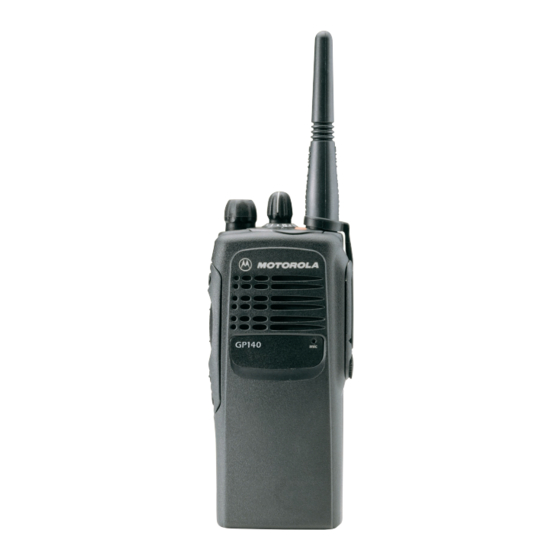Motorola GP280 Manuel de l'utilisateur - Page 41
Parcourez en ligne ou téléchargez le pdf Manuel de l'utilisateur pour {nom_de_la_catégorie} Motorola GP280. Motorola GP280 46 pages. Professional radio, power distribution and controller
Également pour Motorola GP280 : Manuel de l'utilisateur (46 pages), Informations sur les services (32 pages), Informations sur les services (30 pages), Informations sur les services (30 pages)

UG_240_280_EN.fm Page 37 Wednesday, August 14, 2002 10:30 AM
CONVENTIONAL FEATURES
This section outlines the conventional features of your
radio. All references to what is shown on the display is
only valid for GP280 radios. Throughout this section,
the display below
is used to indicate the radio's home display.
REPEAT/DIRECT
The repeat/direct feature allows you to bypass the
repeater and talk directly to another portable radio.
This is known as DIRECT operation. The transmit
frequency is the same as the receive frequency.
•
In REPEAT operation, you talk through the
repeater, which increases the radio's operating
range. The transmit frequency is not the same
as the receive frequency.
•
If the repeat/direct feature is programmed to a
mode, that mode operates on either direct or
repeat operation.
•
If the repeat/direct feature is programmed to the
keypad, you can change the repeat/direct setting
Downloaded from
www.Manualslib.com
PLANT POLICE
manuals search engine
2. Press l (the softkey below DIR).
3. The current talkaround
state appears on the
display for a few
seconds.
4. Then, the display
prompts for the new
state.
5. Press l below the desired talkaround
state: repeat (RPTR) or direct (DIR).
6. The radio returns to the
home display.
SMART PTT
Smart PTT is a per-mode feature which gives the
system manager better control of radio operators.
When smart PTT is enabled in your radio, you cannot
transmit on an active mode. Three radio-wide
variations of smart PTT are available.
•
Transmit Inhibit on Busy Mode—you are
prevented from transmitting if any activity is
REPEATER MODE
or
DIRECT MODE
DIR
RPTR
PLANT POLICE
